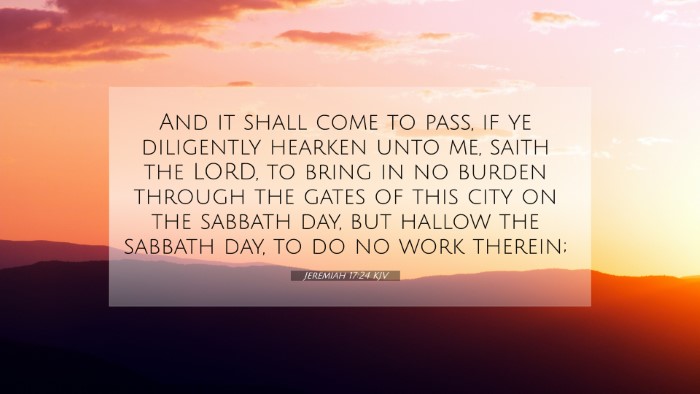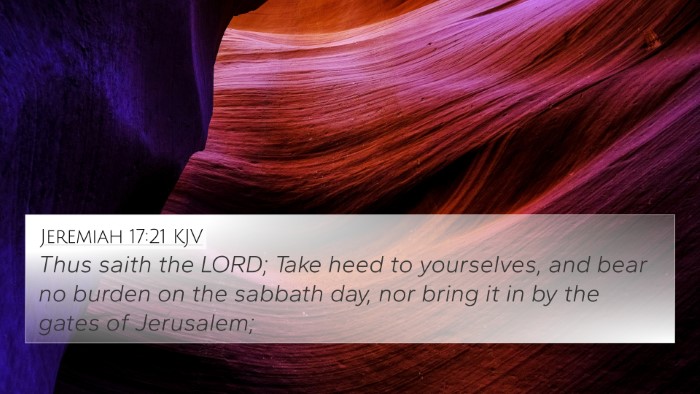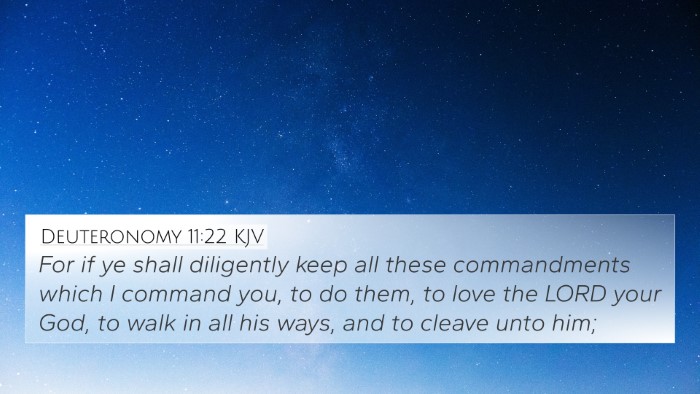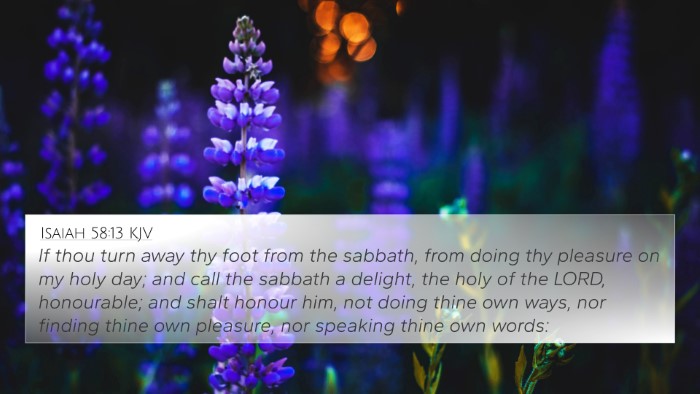Understanding Jeremiah 17:24
The verse Jeremiah 17:24 states, "And it shall come to pass, if ye diligently hearken unto me, saith the Lord, to bring in no burden through the gates of this city on the sabbath day, but hallow the sabbath day, to do no work therein." This scripture holds significant meaning within the context of obedience, holiness, and the importance of the Sabbath. By drawing insights from established public domain commentaries, we can uncover layers of interpretation and application that enrich our understanding of this biblical text.
Context of Jeremiah 17:24
This verse emerges as part of God’s revelation through the prophet Jeremiah. It emphasizes the necessity of observing the Sabbath as a time of rest and spiritual reflection, encouraging the people to honor God's commands. The Sabbath is not just a day of physical rest but a time to align oneself with divine intention.
Combined Insights from Commentaries
-
Matthew Henry:
Henry elucidates the critical nature of the Sabbath as a holy day. He explains that the observance of the Sabbath becomes a sign of God’s covenant with His people, reinforcing the importance of dedicating time to spiritual matters rather than mundane tasks.
-
Albert Barnes:
Barnes notes that the command to refrain from carrying burdens on the Sabbath represents a broader principle of holiness. The act symbolizes one’s commitment to prioritize God over daily life’s distractions and stresses the spiritual implications of observing divine laws.
-
Adam Clarke:
Clarke emphasizes the significance of the phrase "diligently hearken." He reflects on how true obedience requires an active choice to follow divine commands willingly, and this reflects one's heart posture toward God's laws.
Thematic Connections and Cross-References
This verse invites us to explore thematic connections within the Bible that align with the message of Sabbath observance and commitment to God. Here are some significant Bible cross-references that enhance the understanding of Jeremiah 17:24:
- Exodus 20:8-11: The commandment regarding keeping the Sabbath holy.
- Isaiah 58:13-14: A call to honor the Sabbath in a manner that pleases God.
- Hebrews 4:9-10: Reference to the Sabbath rest that believers are invited to enter.
- Mark 2:27: Jesus states, "The Sabbath was made for man, not man for the Sabbath."
- Deuteronomy 5:12-15: Another account of the Sabbath commandment with emphasis on rest.
- Nehemiah 13:15-22: Nehemiah’s re-establishment of Sabbath observance.
- Luke 6:1-5: Jesus’ teaching on the proper understanding of Sabbath observance.
Practical Applications
Understanding Jeremiah 17:24 within its context and with its cross-references invites believers to seriously reflect on their own practices of rest and devotion. The intentional observance of the Sabbath can foster a deeper relational connection with God, enrich personal spirituality, and provide an opportunity for community worship.
Cross-Referencing Biblical Texts
Using tools for Bible cross-referencing, such as Bible concordance and a Bible cross-reference guide, believers can explore these connections in greater detail. Understanding how to use Bible cross-references can deepen comprehension of scriptural themes and relationships. This cross-referencing method aids in identifying intertextual dialogues, such as the connections between Old and New Testament teachings, and helps illuminate the thematic continuity throughout Scripture.
Conclusion
Jeremiah 17:24 serves not only as a historical admonition but as a contemporary call to recognize the sanctity of time set apart for God. As we engage in cross-referencing Bible study methods, we find that this verse connects profoundly with many other scriptures, shedding light on the importance of dedicating ourselves to rest, worship, and obedience to God's will. By understanding the connections between Bible verses, believers are empowered to live out their faith in a way that honors divine intentions.
Further Exploration
For those seeking deeper insights or preparation for sermons, exploring Bible cross-references for sermon preparation can provide invaluable resources. Engaging with inter-Biblical dialogue aids in widening the understanding of how themes evolve and resonate within the biblical narrative. Whether tracing themes such as rest, obedience, or covenant faithfulness, the exploration of cross-references enriches our journey through Scripture.











